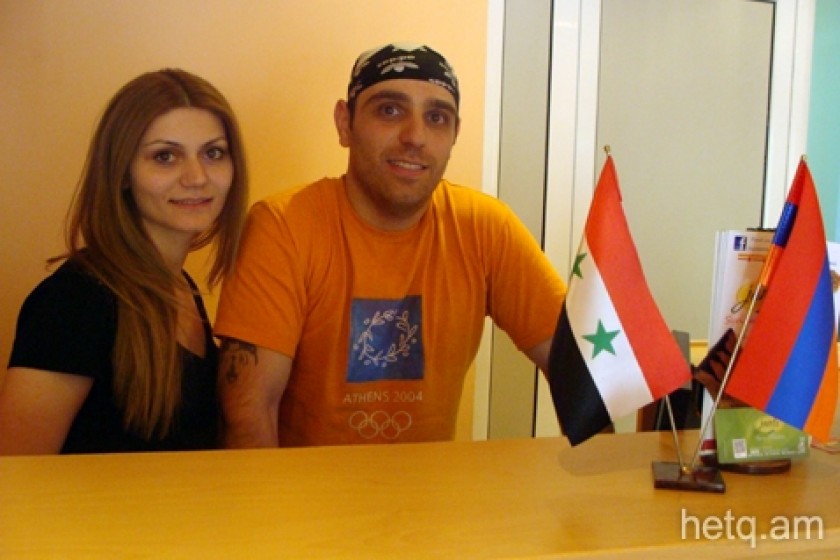
Agob from Al-Hasakah: Learning the Language and Starting a Business in Armenia
Agob Hendyan came to Armenia from the Syrian town of Al-Hasakah four years ago, when the civil war there hadn’t yet started.
He was learning computer design at Damascus University but, upon his fourth year, decided to continue his studies at Yerevan’s State Engineering University.
Agob’s elder brother moved to Armenia fifteen years ago and attended Yerevan Medical University. His younger brother enrolled in the same university last year. Agob’s mother and two sisters moved to Armenia this year. The only family member left in Syria is his father, who works in the Al-Hasakah branch of the Syrian Ministry of Health.
Agob says that Al-Hasakah hasn’t experience any real fighting since it’s located in the far north-east corner of Syria. Nevertheless, once hostilities broke out, life became more expensive.
Contrary to Aleppo and Damascus, there aren’t many Armenians in Al-Hasakah, a mere 100 families according to Agob. The young man only spoke Arabic. Agob’s father was the only family member who knew Armenian.
Agob, now 28, began learning Armenian four years ago by taking language courses at university. At first, he and his fiancée, Armenia native Emma Poghosyan, conversed in English. In fact Emma helped Agob to learn conversational eastern Armenian.
Agob was granted a ten year special residency passport in 2007 and is now preparing to apply for Armenian citizenship. He assembled all the necessary documents but says he can’t find the time to apply.
The reason is the new business he and Emma opened this May 1. It’s called the Janli Syrian Cuisine. “We picked May because it’s a month of victories and May 1 is a holiday,” explains Emma.
Janli is a construct based on Agob’s father’s name Jan and his mother’s name Lila. “My father and mother are my strength,” says Agob, who works the kitchen while Emma, an English translator by profession, is out front greeting customers and waiting on tables.
They have employed a second cook, a young Armenian who used to be Agob’s neighbour in Al-Hasakah. The assistant cook knows practically no Armenian, so Emma converses with him in English and a smattering of Arabic.
After graduating from the State Engineering University, Agob worked for a few months in a computer design office but left because he didn’t like the work. He says that the restaurant business is in his bold and likes nothing better but to prepare the dishes he learnt from his mother and when he lived in Damascus.
The walls of the cafe are plastered with photos of Syrian towns – Hama, Homs, Aleppo... The menu features strictly Syrian fare which is rich and varied in its ingredients, reflecting a number of regional influences.
“Only about 30% of Syrian dishes are included on the menu. There are many things not included,” says Agob and points to the expenses involved. He says that even after the war-induced inflation, Syrian ingredients are still cheaper than there equivalents in Armenia.
The couple says they haven’t encountered any bureaucratic or tax related impediments since opening the cafe.
“If you want, I can start a business in five minutes. It’s that easy in Armenia. What’s tough is getting the business on its feet. It would be more difficult for me to close the place rather than opening it,” says Emma.
The young entrepreneurs figure it will take 2-3 years to recoup their initial investment. This compares to the six months it would take in Syria.
Their only wish is that the Armenian government initiate tax incentives to diaspora Armenians setting up business in the country. “I really love Armenia but it’s tough at first. We are Syrian Armenians and, contrary to popular perceptions, all of us haven’t brought ten million dollars with us,” Agob says.
The young man says that many Armenians from Syria are wary of staring business in Armenia due to the high tax rates. In addition, back in Syria, businesses only pay taxes once a year and not monthly as in Armenia.
“You have to be strong and see it through when you create something here,” says Emma. “We wanted to do something now so that in ten years we could have something to pass down. We don’t want to look back in ten years and see that we did nothing when we were young and capable. We’d rather put in the time and effort now in order to secure a better future.”
Agob confesses that if things settle down in Syria he would most likely return to Al-Hasakah, to which Emma quickly responds by saying that he’s joking.
“So would you leave me here?” Emma asks. “I have no desire to leave my country. I’ve told Agob this a thousand times. I just think that it’s been hard for him at first. It’s the summer season and people are on vacation. There’s no one left in the city. Business will pick up come September.”
Emma is optimistic about the future, Agob less so. She says that if the business gets up and running, she would like to open a second Janli Cafe.
Agob is more uncertain about such a plan, adding that if the taxes remain just as high in the future, a second cafe is out of the question.
Top photo: Agob Hendyan and Emma Poghosyan
 Videos
Videos Photos
Photos
Comments (8)
Write a comment